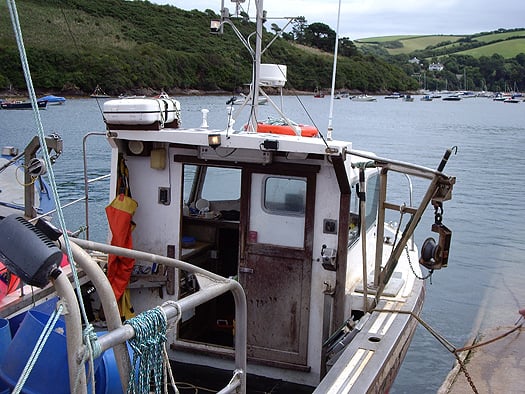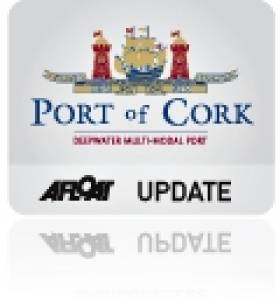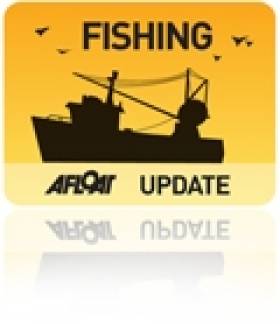Displaying items by tag: Succorfish
Port of Cork Records Sea Bed Ploughing with Ground Breaking 'Succorfish' Technology
#portofcork – A project that has allowed the Port of Cork to precisely monitor and record the winter program of seabed ploughing in real time for the first ever time is being delivered by Succorfish in partnership with Irish marine communication specialists SEA-Tech.
The groundbreaking exercise, which is being carried out aboard a utility vessel working to lift sediment from the port seabed into the water column and back out to sea, sees live, up-to-the-minute and highly valuable location data transferred back to officials instantly in real time. And, given its success, it is anticipated that it could change the way future ploughing operations are carried out as well as greatly improve efficiency for the world's second largest natural harbour.
Succorfish, a leading provider of intelligent M2M data transfer technology, next generation telematic communication systems and GSM/GPRS asset tracking products, has installed its SC2 vessel monitoring unit and RFID winch sensors aboard MV Denis Murphy, a 20m multi-cat utility vessel used for maintenance duties including bed leveling and oil pollution response.
Over the next six months, Port of Cork and SEA-Tech personnel will have the ability to accurately record vessel movement more frequently and in real time, and analyse activity as it happens from specfic harbour areas using the system's innovative 'geofence' facility.
Succorfish Head of Marine, Tom Rossiter, explained, "This project builds on the success working with Welsh scallop fishermen in Cardigan Bay and by partnering with SEA-tech in Ireland, we can demonstrate how the SC2 is becoming an integral piece of equipment for vessel operators whether they be skippers, fleet managers or marine authorities.
"The Port of Cork project is significant as the technology used has the potential to change operational methods and increase efficiency here and at similar ports worldwide. Never before has activities such as ploughing been accurately mapped onshore at the same time as the activity is being carried out on the vessel and this will be beneficial for future planning as well as day to day operations of the port.
Our technology provides the most up to date information from remote areas of the business in an accessible and cost effective manner."
The SC2 monitoring unit uses state of the art GPRS/GSM technology, Iridium satellite reporting as well as bespoke online software to offer the marine industry a complete low cost solution. It includes sector specific features including e-log data reporting, SOS emergency alarm, anti hijack alert, radio frequency identification (RFID), crew safety systems and also deep sea thermal sensor attachments for fishing gears.
The system installed aboard the MV Denis Murphy also offers 100% data security and allows users to access their own information via a password protected online interface.
Critically, and as well as Iridium satellite reporting, this information is available via mobile devices allowing users to monitor progress whilst on the move. The RFID scanner fitted to the heavy duty winches also demonstrates the SC2's ability to monitor activity remotely across all areas of the vessel's operations.
Another proven feature is the geofence facility that manages access to certain areas and alerts the operator by email or text whenever a vessel enters or exits such waters. It is currently used successfully by fishery managers in the UK to monitor marine protected areas to two metres accuracy and gives operators an exceptional level of confidence in knowing the exact location of their vessel at any given time.
Arnaud Disant, Owner of SEA-Tech added, "Information gained from this exercise will be of significant value to both ourselves as specialist marine consultants as well as the Port of Cork as end users. From evidence obtained so far the opportunities that it presents are very encouraging and could have a long lasting effect on how port operators carry out commercial and operational activities both in Ireland and worldwide."
Low Cost Device Could 'Revolutionise' Commerical Fishing, Say Backers
A new, hi-tech global tracking device that could revolutionise the way the commercial fishing industry operates is to be officially launched following a series of successful trials across the South West of England.
Succorfish has worked closely with Seafish to design its newest and most advanced vessel monitoring system; the SC2. It has been developed specifically for the fishing industry and will allow vessels to accurately map and monitor their position using dual GPRS/GSM software to within one metre, provides closer access to marine protected areas such as Lyme Bay whilst avoiding hefty fines previously incurred when breached, and improve and increase overall inshore fishing activity.

Succorfish's new hi-tech global vessel monitoring system, the SC2, can be seen to the right of the light on the wheel-house
The low cost device complies with current UK fishing laws and uses real time satellite and mobile phone technology, as well as online tracking software, to monitor and record the course and position of vessels via up-to-the-minute reporting. Information is then relayed back to a password protected website where users can view their personal data through a graphical user interface.
And, with new EU legislation being introduced in 2012 that will force all 12m-15m vessels to have monitoring systems with satellite reporting, the SC2 is now being regarded as the cost
effective solution to a worldwide fishing industry problem. Additionally, for vessels 15m and over, the product is also e-log ready and directly interfaces with a specialist, state-of-the-art catch reporting software system via a global satellite network.
Nick Prust, SWIFA Chairman and owner of one of the vessels that took part in the trials commented, “This is the solution that the industry has been looking for and the system will be
a real asset to fisherman regardless of their fishing methods. It will give us continued access to fishing grounds with spatial and temporal restrictions whilst allowing us to co-exist alongside
newly proposed MPA’s.”
George Henricks, Commercial Director of Succorfish added, “We have worked very closely with industry representatives and listened long and hard to all of the stakeholders who have
participated in the inshore VMS trial. All of those parties have a common goal in that they want to see the long-term security of both the marine environment and the livelihoods of the
fishermen. Therefore, by designing and developing a product like the SC2, we can directly support the industry and make huge strides towards achieving its goal.”
The SC2 has been developed in conjunction with Seafish and CEFAS following a 12 months pilot project to monitor the UK’s inshore fishing activity. It has been funded by Defra as part of
its remit to undertake economic and social research in the marine environment and overseen by representatives from the Marine Management Organisation (MMO), Natural England, Devon Sea Fisheries Committee, the South West Inshore Fishermen’s Association and the UK Marine Protected Areas Coalition Group.

























































